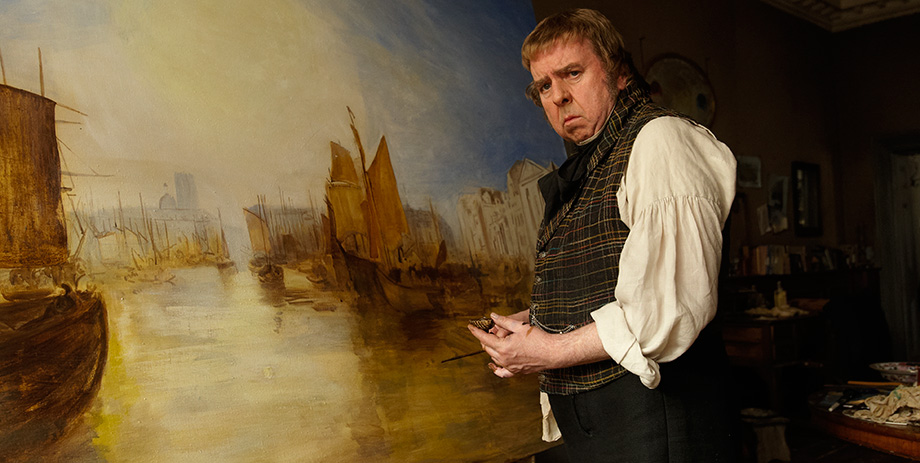A gruff aging landscape painter whose ground-breaking
techniques would be a precursor to the Impressionism movement. A brilliant scientist who
won’t let a debilitating disease get in the way of his destiny. A closeted genius
who basically won World War II for the Allies with the greatest
weapon of all: his brain.
Oscar can’t resist a biopic, and Toronto has more
than its share taking a bow this year–including titles featuring a trio of
British gentlemen who all bettered the world with their talents.
As “Mr. Turner”
begins, director Mike Leigh doesn’t waste any niceties on trying to make the
audience feel comfortable within the confines of a bright and airy early 19th-century abode, as
cantankerous J.M.W. Turner returns from a painting expedition.
Burly and
with a countenance of a sourpuss hedgehog, he will repeatedly go through the
ritual of dropping his tools of his trade and canvases back in their places
while offering grunts and growls in response to inquiries from his shuffling
loyal housekeeper (a quietly marvelous
Dorothy Atkinson), as the film covers the final 25 years of his life.
Leigh regular Timothy Spall, who took home Best Actor honors
at Cannes and deserves many more, is in no rush to fill in all of the spaces of
his portrait of an artist as an aging grump. Instead, the audience must decide
for themselves what makes this contradictory man tick. First, he is indifferent to his tossed-aside
mistress and their two daughters, even denying his children’s very existence. He
uses poor Hannah as a convenient sexual outlet, placing his meaty paws upon her
private parts whenever he feels the need for release.
Yet Turner’s obsessive devotion to his craft–he is rarely
without a sketchbook handy–and refusal to rest on his laurels as he continues
to redefine his technique are admirable. Joseph Mallard William is also kind to
his father, William Sr. who takes great care and pleasure mixing his son’s
paint. Later, Turner shows his romantic side with his jolly twice-widowed
landlady who becomes his second mistress and the closest thing he has to a soul
mate.
The character, however, is most in his element among his
fellow painters at the Art Academy, where their pieces are all closely hung
together as if part of a single work. Turner is at a stage success where he can
joke, mentor and even mock the work of his greatest rival, John Constable
We don’t see Spall engaged in bringing to life many of
Turner’s masterworks, although he memorably uses his own spit at one point to
bring out the right consistency. But they exist onscreen in the gorgeous seaside
panoramas, sailing boats and sprawling rural fields. Leigh, who probably feels
more than a small affinity with his subject, has a period piece that doesn’t
feel stuck in the past but alive in the here and now.

“The Theory of Everything” is an often-rapturous celebration
of the joys of possibility, whether through scientific theories or defying the
odds in everyday life. It also occasionally
falls into the trap of being a by-the-numbers account of astrophysicist Stephen
Hawking’s ongoing fight with debilitating effects of ALS-related motor neuron
disease.
But director James Marsh (whose Oscar-winning doc “Man on
Wire” is an equally awe-inspiring ode to tightrope walker Phillippe Petit) and cinematographer
Benoit Delhomme are able to conjure eye-enticing magic with illuminated objects
and soft focus nearly as well as Turner. Home interiors are accorded the same
visually splendid treatment as fireworks explosions.
However, the one repeated image in “The Theory of Everything”
that burns brighter than any star in the sky? The shy boyish smile that slyly
spreads like warm butter across Eddie Redmayne’s face as he embodies the Cambridge
prof who would forever change the way we perceive the notion of time with his
theories about the universe.
There isn’t a single false moment in the remarkable
performance by the actor who managed the feat of singing live while sobbing as
Marius in “Les Miserables.” Never did I think I wasn’t watching one of the
greatest minds of this or any time rise above the limits placed upon him by a
horrifying illness–including the
two-year life expectancy predicted for him way back in 1963.
But, as it turns out, “The Theory of Everything” is primarily
a unique love story that blossoms as a glorious fairy tale fueled by devotion that
will ultimately be tested by some
difficult realities. The movie is based on a memoir by Hawking’s ex-wife Jane–a Cambridge scholar with a doctorate in her own right–and it doesn’t stint
on the tribulations of caring for such a high-maintenance spouse while raising
three children (Stephen’s brief explanation for being able to perform sexually:
“It’s automatic.”)
Pert, alert and determined as a pit bull, Felicity Jones does
a fine job of rounding out her portrayal of Jane beyond that of a mere put-upon
spouse. But once a handsome, well-built choirmaster at the church where she sings
starts becoming involved in the family’s affairs, you don’t need a degree in physics to
know a bittersweet ending awaits.

For those who are unaware
of England’s code breakers of World War
II and their attempts to crack the crytography of Germany’s Enigma machine–and there have been more than a few previous features as well as docs on the
subject–“The Imitation Game” might
prove to be an entertaining enough intro to this essential slice of history.
Benedict Cumberbatch does well by Alan Turing, the
brilliant and secretly homosexual mathematician, logician and computer pioneer who
leads a team of fellow Brits to bring down the Nazis by deciphering their
attack plans. The social misfit who makes the actor’s contemporary version of
Sherlock seem like clue-finding bon vivant is somewhat of a pathetic literalist
who doesn’t even understand what a joke is yet is invaluable if you have a
puzzle to solve.
But the first English-language film by Norway’s Mortem
Tyldum too often settles for being John Le Carre-style spy games
light. Perhaps the most potentially relevant
part of this reality-based aspect involves Turing’s conviction for gross
indecency in 1951 that eventually destroyed him. How utterly savage is it that
his punishment was a hormonally-induced castration.
Yet that portion of the story is somehow handled as a
mystery thriller, as a detective tries to get to the motive behind a burglary
at Turing’s home where nothing was stolen.
Then there is a third strand that concerns a teen
Turing (a youngster who would be
unlikely to grow up to be Cumberbatch) developing a crush on a classmate in
1928. Yes, it affected him as an adult, but why not show an adult Turing
perhaps enjoying male companionship now and then?
If you are going to make a generic war movie, why not at
least make it interesting by focusing on a female barrier-breaker for once? Keira
Knightley is a proper Anglicized version of spunk, as female Enigma code breaker
Joan Clarke is mistaken initially for a secretarial candidate when she arrives
for a job interview; she proceeds to show up all the guys trying out for a
code-breaking spot by solving a puzzle in record time.
But instead of telling us more about this trailblazer in a
male-dominated field–other than her parents are upset that she isn’t married
at the age of 25–we must deal with her sham opposite-of-romantic engagement to
Turing. There might be a powerful personal tale to be told about what Enigma
meant to the war effort, but “The Imitation Game” is mostly a close imitation.












